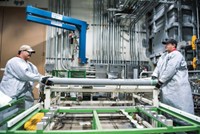Advertisement
Grab your lab coat. Let's get started
Welcome!
Welcome!
Create an account below to get 6 C&EN articles per month, receive newsletters and more - all free.
It seems this is your first time logging in online. Please enter the following information to continue.
As an ACS member you automatically get access to this site. All we need is few more details to create your reading experience.
Not you? Sign in with a different account.
Not you? Sign in with a different account.
ERROR 1
ERROR 1
ERROR 2
ERROR 2
ERROR 2
ERROR 2
ERROR 2
Password and Confirm password must match.
If you have an ACS member number, please enter it here so we can link this account to your membership. (optional)
ERROR 2
ACS values your privacy. By submitting your information, you are gaining access to C&EN and subscribing to our weekly newsletter. We use the information you provide to make your reading experience better, and we will never sell your data to third party members.
Materials
Destroying Syria’s Chemical Weapons
Arms Control: Goal is to eliminate Syrian arsenal by the middle of 2014
by Glenn Hess
October 7, 2013
| A version of this story appeared in
Volume 91, Issue 40

International inspectors arrived in Syria last week to begin the daunting task of overseeing the destruction of President Bashar al-Assad’s chemical weapons program. The country, which has been wracked by civil war, agreed to the action after the threat of a U.S. military strike and international condemnation.
The team of chemists and disarmament specialists from the Organisation for the Prohibition of Chemical Weapons (OPCW) began setting up a base of operations in Damascus. From there they will launch their complex mission of finding, dismantling, and ultimately destroying an estimated 1,000-ton arsenal of deadly chemical agents. Mustard gas and the nerve agent sarin are believed to be among them.
Inspectors must first inventory and secure the Syrian munitions and facilities. But it is still unclear where and how the stockpile will be destroyed, and officials are not releasing more details.
Traditionally, chemical weapons are destroyed in-country at or near weapons storage depots, says James Lewis, communications director of the Center for Arms Control & Non-Proliferation, a think tank in Washington, D.C. “OPCW will likely make a recommendation, but it is Syria’s ‘responsibility’ to destroy their stockpile,” Lewis tells C&EN.
Paul F. Walker, an expert on chemical weapons at the environmental organization Green Cross International, says the demilitarization effort will likely have to be undertaken within Syria. And to be successful, he adds, OPCW will need the help of other countries with experience in destroying chemical munitions, namely the U.S. and Russia.
OPCW’s plan was authorized by the United Nations Security Council on Sept. 27. The plan calls for the destruction of Syria’s chemical weapons production capability by Nov. 1 and the elimination of all chemical weapons by mid-2014. Many experts, however, think this timeline is highly ambitious, at best.
The Hague-based OPCW is a UN-affiliated body that administers the Chemical Weapons Convention, an arms control agreement that bans the production, stockpiling, and use of chemical weapons and their precursors.



Join the conversation
Contact the reporter
Submit a Letter to the Editor for publication
Engage with us on Twitter